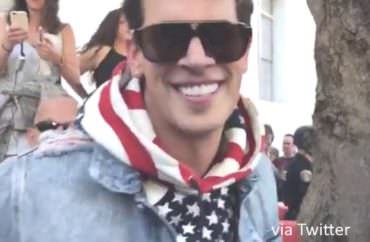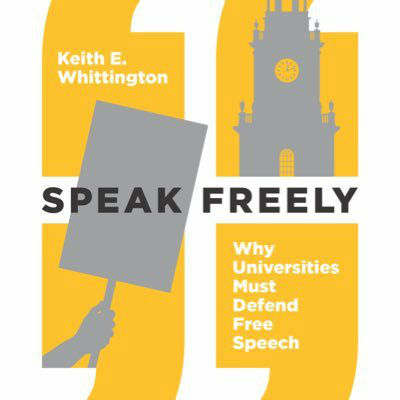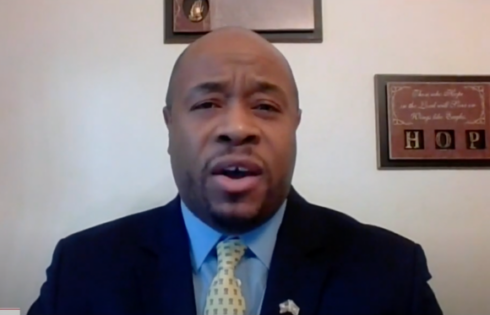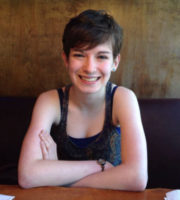
‘Avoiding any mention of those actually doing the disrupting’
The University of California-Berkeley’s Commission on Free Speech is facing criticism from conservative students and a Princeton University expert on free speech for blaming “ultra-conservative rhetoric” as the cause of campus unrest since the 2016 election.
One of the co-chairs of the commission told The College Fix the physical threats directed toward conservative speakers may have been a fluke, rather than a continuing trend at the university known for its “Free Speech Movement” more than 50 years ago.
The UC-Berkeley chapter of the College Republicans is pointing the finger instead at the administration’s allegedly lax attitude toward violent disruption before last fall’s string of conservative events with a higher security presence.
The administration isn’t committing to the findings and recommendations in the report, telling The Fix it will be reviewed in depth over the summer.
‘We believe this is largely due to the rise to semi-respectability of the alt-right’
The commission released its report last month after hosting three public hearings in the winter to draw campus testimony.
Its mission was to find a better way to manage “major events hosted by non-departmental users,” given the destructive and violent opposition that greeted anti-feminist provocateur Milo Yiannopoulos and anti-immigration pundit Ann Coulter in the first half of 2017.
Three times in the report, the commission highlighted the $4 million the university spent to protect events last fall featuring Yiannopoulos and conservative pundit Ben Shapiro. “This is not sustainable, especially for a campus in the throes of eliminating a $150+ million deficit.”
Most controversially, the commission said that the 2016 election “legitimized” white supremacist views and protest marches, leading “far-right and alt-right activists to ‘spike the football’ at Berkeley.”
This “ultra-conservative rhetoric … provoked an at-times violent (and condemnable) response from the extreme left, tearing at the campus’s social fabric,” according to the report.
“The substantive recommendations of the report strike me as generally reasonable,” Keith Whittington, professor of politics at Princeton, told The Fix. His new book Speak Freely: Why Universities Must Defend Free Speech is the official “pre-read” for Princeton’s incoming class.
MORE: ‘We can only exercise our right to free speech insofar as we feel safe’
 He said the recommendations “seem to take care to emphasize the importance of the campus remaining open to a wide range of speech and perspectives and of accommodating even large and disruptive events while keeping the campus functioning.”
He said the recommendations “seem to take care to emphasize the importance of the campus remaining open to a wide range of speech and perspectives and of accommodating even large and disruptive events while keeping the campus functioning.”
But Whittington criticized the “rhetorical framing” of the report for assigning heavy blame to “conservative provocateurs for campus disruptions, while avoiding any mention of those actually doing the disrupting or considering any policy reform or administrative change designed to curb disruptive protests that have hampered the ability of conservatives to speak on campus.”
The Fix asked UC-Berkeley Prof. Jay Wallace, commission co-chair, how the alt-right’s rise contributed to the aggressive opposition to speakers including Shapiro, the top journalistic target for anti-Semitism in the year surrounding the 2016 election. Police arrested nine people at Shapiro’s fall speech.
“To some extent, Shapiro might just have been at the wrong place at the wrong time,” Wallace responded in an email:
He was a provocative and prominent conservative scheduled to speak around the same time as Milo’s “free speech week” at Berkeley, and this was shortly after the disturbing events in Charlottesville last summer. The general climate was particularly charged at that moment, and we believe this is largely due to the rise to semi-respectability of the alt-right.
The report zeroes in on the different receptions given to Shapiro before and after the 2016 election: He spoke “without controversy” in April 2016 but cost the administration $600,000 for security in September 2017. It contrasts Shapiro as a speaker committed to “broaden[ing] the political discourse” with Yiannopoulos and Coulter, who show “little interest in reasoned discussion of contentious issues.”
Wallace drew a contrast between the chaos surrounding conservative speakers a year ago and other prominent conservative invitees – Turning Point USA founder Charlie Kirk, former Senator Rick Santorum and radio host Dennis Prager – this spring.
“The campus worked closely and effectively” with the Berkeley College Republicans on these latest events, and they “went smoothly and without disruption (or press coverage, for some reason),” Wallace said. They also didn’t need “special security measures, so perhaps things are becoming somewhat calmer.”
‘It’s laughable’
Bradley Devlin, vice president of the Berkeley College Republicans, offered a different explanation for the decrease in leftist violence.
“The university finally listened to the Berkeley College Republicans and provided security for these events” this spring, in contrast to the “stand down orders” from police in early 2017 and lone arrest during the first Yiannopoulos event, he wrote in an email.
“This only emboldened the rioters, and gave them a false sense of victory,” Devlin continued: “When the police presence for Ben Shapiro begrudgingly enforced the law, a new sense of order was restored.”
Devlin also strongly disagreed with the report’s contention that the university generally promotes free speech on campus.
His club is “routinely harassed and assaulted on campus” and has given campus police “photographic or video evidence of such assaults,” but UC-Berkeley “has failed to reprimand any of the perpetrators,” Devlin said. “That is why conservative students think it’s laughable when the Free Speech Commission continues to claim UC Berkeley is a tolerant campus.”
MORE: UC-Berkeley charges less for Sonia Sotomayor than Ben Shapiro
Our 2018-2019 Executive Board is seated today! We look forward to continue fighting for free speech at UC Berkeley and advancing the conservative agenda. pic.twitter.com/CcyGCsECyv
— Berkeley College Republicans (@BerkeleyCRs) May 3, 2018
Chandler Thornton, national chairman of the College Republican National Committee, went beyond the report’s rhetorical framing.
The organization, which marked its 125th anniversary last year, has “always led the movement for greater campus dialogue, the open marketplace of ideas, and freedom of speech,” but the commission “missed the mark” with its recommendations, he told The Fix in an email.
He criticized its support for the new “major events policy,” which is targeted in the Berkeley College Republicans’ lawsuit against the school, and its proposed third “free speech zone” on campus, “which we do not believe to be conducive to free speech” as opposed to not limiting speech to zones.
Thornton also denounced the report’s advice that law enforcement should have a “less intimidating presence” and that students should balance “their right to hold [campus] events with their responsibility to the community.”
“We should be protecting free speech, and promoting respectful discourse between all perspectives, not stifling free speech with more bureaucratic red tape,” he told The Fix.
Devlin went even further:
This is the latest attempt by the university to avoid responsibility for fostering a radical leftist environment where violent behavior is deemed acceptable, or even encouraged. Leftists from ANTIFA, and other organizations, remain solely responsible for the violence perpetrated against the Berkeley campus and community. To suggest otherwise is morally odious.
College Republicans and Princeton’s Whittington aren’t the only observers criticizing the report’s blame game. Washington Post columnist Megan McArdle wrote that the commission “can’t quite keep themselves from implying” that the university should block speakers that “antifa doesn’t like.”
MORE: BCRs sue UC-Berkeley for rules designed to censor their speakers
Must denounce ‘intentional provocation’
Though the report affirms the right of student groups to invite anyone to speak, it also distinguishes productive events from “disturbing” and purely “provocative” speech.
The latter requires counterprogramming from the administration, according to the commission, which contends that “senior leadership should state loudly, clearly, and more than once that it disapproves of intentional provocation.”
Asked to clarify what constitutes provocative speech, Wallace told The Fix:
Well, I’d say it is speech that is intended merely to denigrate, insult, demean, and exclude targeted individuals and populations. How would you describe a speaker who states that ‘feminism is a cancer’? [a Yiannopoulos catchphrase]. Would that be an accidental or intentional provocation?
The report particularly identifies the speech of Coulter and Yiannopoulos as “hard to defend, especially in light of the acute distress it caused (and was intended to cause) staff and students, many of whom felt threatened and targeted by the speakers and by the outside groups financing their appearances.”
Asked how many members of the community had expressed “acute distress” by these two speakers, Wallace said he didn’t have a number:
To be absolutely clear: we don’t believe that students feeling ‘distress’ or ‘threatened’ provide grounds for trying to keep a speaker off campus, but nor do we understand why some observers take issue with a campus that seeks to provide support to students of all political persuasions even as it firmly stands by its commitments to uphold the first amendment… [sic] including the expenditure of millions of dollars to ensure events can be safely held.
The university administration has neither aligned with nor distanced itself from the report.
Spokesperson Dan Mogulof told The Fix that the chancellor’s office could not yet comment on the commission’s recommendations: “Given the importance and complexity of the issues covered by the report, they intend to take the time necessary to carefully review and discuss the commission’s findings and recommendations before decisions are made about next steps.”
In the meantime, “the Chancellor will maintain our unwavering support for Free Speech, as well as our complete neutrality when it comes to the political perspectives of speakers and/or the perspectives of the various student organizations who host speakers on our campus,” Mogulof said.
MORE: Coulter pulls out of UC-Berkeley speech: ‘Free speech crushed by thugs’
IMAGE: Princeton University Press
Like The College Fix on Facebook / Follow us on Twitter






Please join the conversation about our stories on Facebook, Twitter, Instagram, Reddit, MeWe, Rumble, Gab, Minds and Gettr.